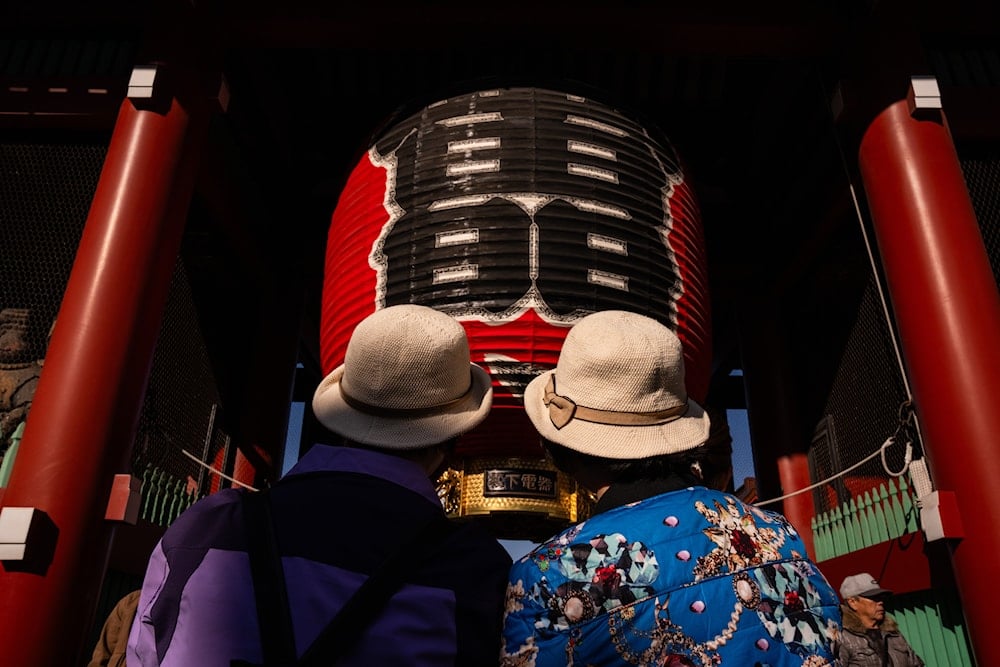Rising China–Japan tensions spill into culture, tourism
A diplomatic rift between China and Japan has deepened significantly, with China's retaliation now extending into both cultural and tourism sectors.
-

Chinese tourists visit Sensoji temple in the Asakusa district of Tokyo, Japan, on November 20, 2025. (AP)
China has canceled around a dozen concerts featuring Japanese musicians, including celebrated jazz bassist Yoshio Suzuki, following remarks by Japan’s recently appointed Prime Minister, Sanae Takaichi, who threatened to interfere militarily in Taiwan.
Suzuki’s band was interrupted mid sound‑check by Chinese authorities, according to reports. Authorities reportedly instructed venues across major Chinese cities to cancel any Japanese acts for the rest of 2025. Moreover, promoters and venues were told not to submit new applications for Japanese performers for 2026, and organized communication to fans about upcoming Japanese gigs has been banned.
Other affected artists include singer KOKIA and rapper KID FRESINO, whose China tour has been put on indefinite hold.
Tourism fallout: Cruises rerouted, bookings plunge
The diplomatic spat is also rippling through the tourism sector. Chinese cruise companies are reportedly rerouting vessels to avoid Japanese ports.
One example is Adora Magic City, which has postponed scheduled stops in Fukuoka, Sasebo, and Nagasaki, and will instead extend its stay in Jeju, South Korea, from the typical nine hours to as long as 31–57 hours.
The shift is expected to benefit South Korea’s tourism industry, with other Chinese cruise lines reportedly exploring longer itineraries in Incheon and Busan.
Meanwhile, Japan's tourism sector has taken a hit. Tokyo-based travel agencies reported an 80% drop in Chinese bookings for the remainder of the year. On the other side, South Korean travel and hospitality stocks are rallying in anticipation of an influx of redirected Chinese tourists.
Read more: Chinese travelers cancel 500,000 flights amid Japan tensions
Underlying cause: Taiwan comments ignite Chinese retaliation
At the heart of the crisis lie Takaichi’s recent comments regarding Taiwan, as she claimed that Chinese military action in Taiwan could pose an existential threat to Japan, suggesting Tokyo might consider a military response. Beijing viewed this as a gross violation of the One China principle, reacting swiftly and signaling that the remarks would have “consequences.”
China’s response has so far included a travel advisory against Japan, a reported seafood import ban, and now a broad cultural and tourism ban.
The Chinese Foreign Ministry said Takaichi’s remarks have “severely damaged the atmosphere” for people-to-people exchanges. According to Japan Tourism Agency statistics, Chinese visitors to Japan make up nearly a quarter of all foreign tourists. Nearly 7.5 million visitors from mainland China have traveled to the country in the first nine months of this year, The Japan Times reported.
Japan’s historical aggression against China
Japan’s relationship with China is deeply shaped by history. From the early 20th century through World War II, Japan’s military invasions and occupations of Chinese territory left a legacy of mistrust and trauma, resulting from countless war crimes that continue to influence bilateral relations.
Post-war, Tokyo officially adopted the One-China principle, establishing diplomatic ties with Beijing in 1972 and formally renouncing claims over Taiwan.
In recent years, however, Japan has gradually shifted toward a more aggressive, even militant posture, moving to contain China's growing influence. Legal reforms in 2015 expanded the scope of Japan’s Self-Defense Forces, allowing limited military operations abroad, and eroding Tokyo's traditional passive military doctrine.
Takaichi’s recent statements on Taiwan underscore a willingness to contemplate military action in scenarios previously considered beyond Japan’s defensive mandate, marking a departure from decades of cautious adherence to the One-China principle and signaling heightened tensions in the Taiwan Strait.
Read more: Japan’s GDP shrinks in Q3 amid export slump and US tariffs

 4 Min Read
4 Min Read










